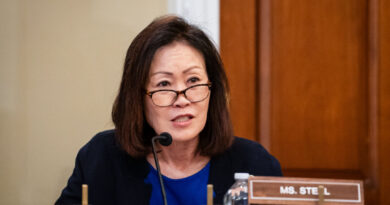Brazilian Police Target Chinese Money Laundering Scheme
The investigation, which began in 2022, brings evidence of the involvement of criminal groups linked to illegal activities such as drug trafficking, arms trafficking, and smuggling.
According to the federal police, its main objective was to move a constant flow of money to China, but it also served people looking to hide capital, launder money, or send or receive money from abroad.
The case revealed a parallel and illegal banking system, which moved billions not only within Brazil but also in the United States, Canada, Panama, Argentina, Bolivia, Colombia, Paraguay, Peru, the Netherlands, England, Italy, Turkey, Dubai, and especially Hong Kong and China.
Dozens of people were involved in the case, including Brazilians as well as foreigners who held various jobs and positions, such as military and civil police officers, bank managers, and accountants.
Investigations indicate that the suspects, as well as individuals and companies involved in the case, have moved around 120 billion reais ($20 billion) in recent years.
In addition to 16 preventive arrest warrants and 41 search and seizure warrants, the Brazilian Federal Court ordered the blocking of assets and values of more than 200 companies, estimated at around $10 billion reais ($1.7 billion).
China at Center of Fentanyl Crisis
Robert Evan Ellis, a researcher and professor of Latin American affairs at the U.S. Army War College, told The Epoch Times there are similarities between this case in Brazil and the recent cases of money laundering coordinated by Chinese nationals in the United States involving Mexican cartels.
“This is a particular challenge,“ Ellis stated. ”First of all, because the amount of technical access that persons in law enforcement in the region have to cooperate with their Chinese counterparts and oversight into bank accounts in Chinese banks and other aspects of trade involving PRC-based companies is very limited. And so in the shadows, it’s easier for criminal groups to hide.”
The trio were among 24 people involved in the case who were identified as associates of the Sinaloa cartel in Los Angeles.
U.S. prosecutors accused them of working for a transnational money laundering organization, conducting financial transactions with profits derived from the sale of fentanyl and other illicit drugs in the United States.
Ellis said that a restriction imposed by the Chinese regime that generally restricts people who live, work, or invest in China from withdrawing more than $50,000 from within the country is now being used by these money laundering groups.
“In Mexico, what you saw was a complex scheme in which Mexican cartel representatives with bulk cash in the United States would transfer that cash to wealthy business people in China in terms of the ownership of that cash still in the United States without the Chinese government. And so the Chinese government, without the cash ever moving across borders, allowed the wealthy people in China to essentially get their money out to the United States,” Ellis said.
The report also identified more than 100 criminal networks linked to China, with diverse structures and involvement in various illegal economies.
China, meanwhile, is mainly responsible for supplying the chemical precursors used to produce fentanyl, as well as the machines used to press it.
The Chinese regime has also been accused of subsidizing the industry of fentanyl precursors.
Brazil and Increased Economic Ties With China
Ellis said this new scheme uncovered in Brazil was a result of the strengthening of financial ties with the Chinese regime.
“What we’re seeing in Brazil here on a massive scale is consistent with the evolution of Chinese organized crime ties that you see across the region, which is specifically with the development of licit commerce and connections between people and commercial infrastructure between China and Latin America, as well as financial infrastructure. Naturally, options for illicit activities are also evolving,” he said.
“This is a growing problem that authorities in Brazil, like Mexico and other places, will have to deal with as one of the unfortunate consequences of growing legitimate commercial and financial ties.”
On Nov. 20, after the G20 meeting held in Brazil, Brazilian President Luiz Inácio Lula da Silva met with the leader of the Chinese Communist Party, Xi Jinping.
During the meeting, 37 agreements were signed between the two countries in 15 different sectors, such as technology, agriculture, educational exchange, and others.
Briefly mentioning the agreement between the two banks, Ellis pointed out that the Tai-Pan operation is “a reminder that such expanding penetration by the Chinese financial system does create ever greater vulnerabilities to organized crime and money laundering”
During the meeting between the two leaders, it was also announced that bilateral relations between Brazil and China had been upgraded to the status of “Global Strategic Partnership to the level of Community of Shared Future for a Fairer World and a Sustainable Planet.”
What Xi calls a “community of common destiny” would be in conflict with President-elect Donald Trump’s proposal to “make America great again,” he said.
Marcos Schotgues contributed to this report





